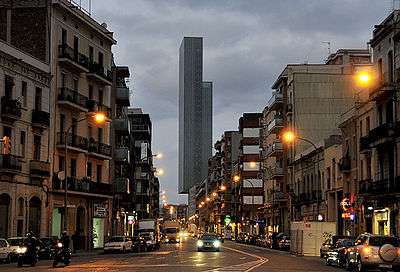El Poblenou

El Poblenou (Catalan pronunciation: [əɫ ˌpɔbːɫəˈnɔw], Catalan for new village) is an extensive neighborhood of Barcelona (Sant Martí district) that borders the Mediterranean sea to the south, Sant Adrià del Besòs to the east, Parc de la Ciutadella in Ciutat Vella to the west, and Horta-Guinardó and Sant Andreu to the north. It is technically part of the Eixample, its layout having been drafted by Ildefons Cerdà, although the historic center of the neighborhood (which was once a town entirely separated from Barcelona) predates the grid.
History
During the Industrial Revolution of the 19th century, Poblenou was the epicenter of Catalan and Iberian industry, earning it its sobriquet of the Catalonian Manchester. Surrounding the extensive cluster of factories stood mostly working class residential areas.When the industrial buzz pass off the neighborhood fell into a state of abandon and After a period of decay, the neighborhood has undergone a dramatic transformation.The olympic games in 1992 were the main trigger for this massive transformation of El Poblenou.[1] Many of the areas that have been developed—including the Vila Olímpica, the Diagonal Mar area, and the Fòrum area—arguably comprise their own neighborhoods. Completing its original, unfinished plan, The Avinguda Diagonal now stretches from Plaça de les Glòries to the sea. The massive 22@ plan sets to convert Poblenou into the city's technological and innovation district, as well as to increase leisure and residential spaces.
Alongside the newly built, upscale Vila Olímpica and Diagonal Mar areas, many artists and young professionals have converted the former factories and warehouses into lofts, galleries, and shops. Art & Design schools and studios have also opened, making the area known for its creative outlook. The leafy Rambla de Poblenou, which stretches from Avinguda Diagonal to the beach, is the main commercial street.
Life in El Poblenou
El Poblenou lies between the great beaches of Barcelona and city center which allow its resident on one hand a great chilled beach life and on the other hand proximity to a huge variety of shopping centers, bars and restaurants. Prices of flats in that area tend to be relatively low which makes this area a great place to live in. This neighborhood offers except of great beaches the wide open spaces, green parks and lack of tourists.[2]
Landmarks
Notable buildings of Poblenou include the Torre Agbar (Jean Nouvel), Herzog & de Meuron's Forum Building (which houses Europe's largest scale model of a city), and the ME Barcelona Hotel (former Habitat Sky Hotel) (Dominique Perrault). Major public spaces include the Parc de Diagonal Mar (Enric Miralles), the Plaça de les Glòries Catalanes, the Parc Central del Poblenou (Jean Nouvel), the beachfront Parc del Poblenou, the vast Parc del Forum, Oficines Diagonal 197 (David Chipperfield), the Media-Tic Building (Enric Ruiz Geli - CLOUD 9) (the historic Poblenou Cemetery as well as many kilometres of beaches.
-

View of construction in Poblenou, Barcelona, resulting from the 22@ urban renewal plan.
-

Modernista building on a corner of Rambla del Poblenou (Barcelona).
-

View of Carrer Pallars in Poblenou, showing renovation of underground infrastructure, as well as one of many former factories next to a modern building.
In popular culture
The 1994 Catalan language TV3 soap opera Poblenou was chiefly set in this area of the city.
Public transport
- Barcelona Metro line 1 stations: Marina, Glòries
- Barcelona Metro line 4 stations: Selva de Mar, Poblenou, Llacuna, Bogatell
- Trambesòs stations: Glòries, Ca l'Aranyó, Pere IV, Fluvià
See also
References
- ↑ Mouckley, Benny. "Poblenou guide". SuiteLife. SuiteLife.
- ↑ Israely, Tamir. "El Poblenou guide". SuiteLife. SuiteLife.
External links
| Wikimedia Commons has media related to Sant Martí. |
- Poblenou Apartments guide
- Online tour of Poblenou from the City's web
- Website of 22@ 'The Innovation District'
- Poblenou neighbourhood association
- Information on the Parc Central del Poblenou
- Sant Martí council
- The real Barcelona, real Poblenou. Know the truth
- Poblenou Potential of Barcelona
| ||||||||||||||||||||||||||||||||||||||||||
Coordinates: 41°23′57″N 2°12′14″E / 41.39917°N 2.20389°E